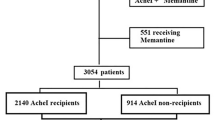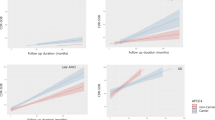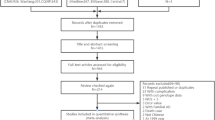Abstract
Factors that influence response to drug treatment are of increasing importance. We report an analysis of genetic factors affecting response to cholinesterase inhibitor therapy in 165 subjects with Alzheimer's disease (AD). The presence of apolipoprotein E ɛ4 (APOE ɛ4) allele was associated with early and late cognitive response to cholinesterase inhibitor treatment in mild AD (Mini-Mental State Examination (MMSE) ⩾21) (P<0.01). In moderate-to-severe AD (MMSE ⩽15), presence of the BCHE-K variant was associated with late response to cholinesterase inhibitor treatment (P=0.02). Testing for APOE and BCHE genotypes may be useful in therapeutic decision making.
This is a preview of subscription content, access via your institution
Access options
Subscribe to this journal
Receive 6 print issues and online access
$259.00 per year
only $43.17 per issue
Buy this article
- Purchase on Springer Link
- Instant access to full article PDF
Prices may be subject to local taxes which are calculated during checkout
Similar content being viewed by others
References
World Health Organization. World Health Report 2003—Shaping the Future. WHO: Geneva, 2003.
National Collaborating Centre for Mental Health. Dementia: a NICE-SCIE Guideline on Supporting People with Dementia and their Carers in Health and Social Care 2007.
Ferri CP, Prince M, Brayne C, Brodaty H, Fratiglioni L, Ganguli M, Alzheimer's Disease International. Global prevalence of dementia: a Delphi consensus study. Lancet 2005; 366: 2112–2117.
Davies P, Maloney AJ . Selective loss of central cholinergic neurons in Alzheimer's disease. Lancet 1976; 2: 1403.
Bartus RT, Dean III RL, Beer B, Lippa AS . The cholinergic hypothesis of geriatric memory dysfunction. Science 1982; 217: 408–414.
Whitehouse PJ, Price DL, Struble RG, Clark AW, Coyle JT, Delon MR . Alzheimer's disease and senile dementia: loss of neurons in the basal forebrain. Science 1982; 215: 1237–1239.
Birks J . Cholinesterase inhibitors for Alzheimer's disease. Cochrane Database Syst Rev 2006; 1: CD005593.
Emre M . Switching cholinesterase inhibitors in patients with Alzheimer's disease. Int J Clin Pract Suppl 2002; 127: 64–72.
Cacabelos R . Pharmacogenomics and therapeutic prospects in dementia. Eur Arch Psychiatry Clin Neurosci 2008; 258 (Suppl 1): 28–47.
Saunders AM, Schmader K, Breitner JC, Benson MD, Brown WT, Goldfarb L et al. Apolipoprotein E epsilon 4 allele distributions in late-onset Alzheimer's disease and in other amyloid-forming diseases. Lancet 1993; 342: 710–711.
Poirier J, Delisle MC, Quirion R, Aubert I, Farlow M, Lahiri D et al. Apolipoprotein E4 allele as a predictor of cholinergic deficits and treatment outcome in Alzheimer disease. Proc Natl Acad Sci USA 1995; 92: 12260–12264.
Craft S, Teri L, Edland SD, Kukull WA, Schellenberg G, McCormick WC et al. Accelerated decline in apolipoprotein E-epsilon4 homozygotes with Alzheimer's disease. Neurology 1998; 51: 149–153.
Mortensen EL, Hogh P . A gender difference in the association between APOE genotype and age-related cognitive decline. Neurology 2001; 57: 89–95.
Farlow MR, Lahiri DK, Poirier J, Davignon J, Hui S . Apolipoprotein E genotype and gender influence response to tacrine therapy. Ann N Y Acad Sci 1996; 802: 101–110.
Farlow MR, Lahiri DK, Poirier J, Davignon J, Schneider L, Hui SL . Treatment outcome of tacrine therapy depends on apolipoprotein genotype and gender of the subjects with Alzheimer's disease. Neurology 1998; 50: 669–677.
Lucotte G, Oddoze C, Michel B . Apolipoprotein E genotype allele ɛ4 and response to tacrine in Alzheimer's disease. Alzheimer's Res 1996; 2: 101–102.
MacGowan SH, Wilcock GK, Scott M . Effect of gender and apolipoprotein E genotype on response to anticholinesterase therapy in Alzheimer's disease. Int J Geriatr Psychiatry 1998; 13: 625–630.
Oddoze C, Michel B, Lucotte G . Apolipoprotein E4 allele predicts a better response to donepezil therapy in Alzheimer's disease. Alzheimer's Rep 2000; 3: 213–216.
Bizzarro A, Marra C, Acciarri A, Valenza A, Tiziano FD, Brahe C et al. Apolipoprotein E epsilon4 allele differentiates the clinical response to donepezil in Alzheimer's disease. Dement Geriatr Cogn Disord 2005; 20: 254–261.
Choi SH, Kim SY, Na HR, Kim BK, Yang DW, Kwon JC et al. Effect of ApoE genotype on response to donepezil in patients with Alzheimer's disease. Dement Geriatr Cogn Disord 2008; 25: 445–450.
Farlow MR, Cyrus PA, Nadel A, Lahiri DK, Brashear A, Gulanski B . Metrifonate treatment of AD: influence of APOE genotype. Neurology 1999; 53: 2010–2016.
Wilcock GK, Lilienfeld S, Gaens E . Efficacy and safety of galantamine in patients with mild to moderate Alzheimer's disease: multicentre randomised controlled trial. Galantamine International-1 Study Group. BMJ 2000; 321: 1445–1449.
Rigaud AS, Traykov L, Caputo L, Guelfi MC, Latour F, Couderc R et al. The apolipoprotein E epsilon4 allele and the response to tacrine therapy in Alzheimer's disease. Eur J Neurol 2000; 7: 255–258.
Aerssens J, Raeymaekers P, Lilienfeld S, Geerts H, Konings F, Parys W . APOE genotype: no influence on galantamine treatment efficacy nor on rate of decline in Alzheimer's disease. Dement Geriatr Cogn Disord 2001; 12: 69–77.
Almkvist O, Jelic V, Amberla K, Hellstrom-Lindahl E, Meurling L, Nordberg A . Responder characteristics to a single oral dose of cholinesterase inhibitor: a double-blind placebo-controlled study with tacrine in Alzheimer patients. Dement Geriatr Cogn Disord 2001; 12: 22–32.
Winblad B, Engedal K, Soininen H, Verhey F, Waldemar G, Wimo A, Donepezil Nordic Study Group. A 1-year, randomized, placebo-controlled study of donepezil in patients with mild to moderate AD. Neurology 2001; 57: 489–495.
Rigaud AS, Traykov L, Latour F, Couderc R, Moulin F, Forette F . Presence or absence of at least one epsilon 4 allele and gender are not predictive for the response to donepezil treatment in Alzheimer's disease. Pharmacogenetics 2002; 12: 415–420.
Visser PJ, Scheltens P, Pelgrim E, Verhey FR, Dutch ENA-NL-01 Study Group. Medial temporal lobe atrophy and APOE genotype do not predict cognitive improvement upon treatment with rivastigmine in Alzheimer's disease patients. Dement Geriatr Cogn Disord 2005; 19: 126–133.
Ballard CG, Greig NH, Guillozet-Bongaarts AL, Enz A, Darvesh S . Cholinesterases: roles in the brain during health and disease. Curr Alzheimer Res 2005; 2: 307–318.
Evans RT, Wardell J . On the identification and frequency of the J and K cholinesterase phenotypes in a Caucasian population. J Med Genet 1984; 21: 99–102.
Bartels CF, Jensen FS, Lockridge O, van der Spek AF, Rubinstein HM, Lubrano T et al. DNA mutation associated with the human butyrylcholinesterase K-variant and its linkage to the atypical variant mutation and other polymorphic sites. Am J Hum Genet 1992; 50: 1086–1103.
O’Brien KK, Saxby BK, Ballard CG, Grace J, Harrington F, Ford GA et al. Regulation of attention and response to therapy in dementia by butyrylcholinesterase. Pharmacogenetics 2003; 13: 231–239.
Perry E, McKeith I, Ballard C . Butyrylcholinesterase and progression of cognitive deficits in dementia with Lewy bodies. Neurology 2003; 60: 1852–1853.
Lehmann DJ, Johnston C, Smith AD . Synergy between the genes for butyrylcholinesterase K variant and apolipoprotein E4 in late-onset confirmed Alzheimer's disease. Hum Mol Genet 1997; 6: 1933–1936.
McIlroy SP, Crawford VL, Dynan KB, McGleenon BM, Vahidassr MD, Lawson JT et al. Butyrylcholinesterase K variant is genetically associated with late onset Alzheimer's disease in Northern Ireland. J Med Genet 2000; 37: 182–185.
Tilley L, Morgan K, Grainger J, Marsters P, Morgan L, Lowe J et al. Evaluation of polymorphisms in the presenilin-1 gene and the butyrylcholinesterase gene as risk factors in sporadic Alzheimer's disease. Eur J Hum Genet 1999; 7: 659–663.
Wiebusch H, Poirier J, Sevigny P, Schappert K . Further evidence for a synergistic association between APOE epsilon4 and BCHE-K in confirmed Alzheimer's disease. Hum Genet 1999; 104: 158–163.
Panegyres PK, Mamotte CD, Vasikaran SD, Wilton S, Fabian V, Kakulas BA . Butyrycholinesterase K variant and Alzheimer's disease. J Neurol 1999; 246: 369–370.
Singleton AB, Smith G, Gibson AM, Woodward R, Perry RH, Ince PG et al. No association between the K variant of the butyrylcholinesterase gene and pathologically confirmed Alzheimer's disease. Hum Mol Genet 1998; 7: 937–939.
Kehoe PG, Williams H, Holmans P, Wilcock G, Cairns NJ, Neal J et al. The butyrylcholinesterase K variant and susceptibility to Alzheimer's disease. J Med Genet 1998; 35: 1034–1035.
Russ C, Powell J, Lovestone S, Holmes C . K variant of butyrycholinesterase and late-onset Alzheimer's disease. Lancet 1998; 351: 881.
Grubber JM, Saunders AM, Crane-Gatherum AR, Scott WK, Martin ER, Haynes CS et al. Analysis of association between Alzheimer disease and the K variant of butyrylcholinesterase (BCHE-K). Neurosci Lett 1999; 269: 115–119.
Alvarez-Arcaya A, Combarros O, Llorca J, Sanchez-Guerra M, Berciano J, Fernandez-Viadero C et al. The butyrylcholinesterase K variant is a protective factor for sporadic Alzheimer's disease in women. Acta Neurol Scand 2000; 102: 350–353.
Laws SM, Taddei K, Fisher C, Small D, Clarnette R, Hallmayer J et al. Evidence that the butyrylcholinesterase K variant can protect against late-onset Alzheimer's disease. Alzheimer's Rep 1999; 2: 219–223.
Lehmann DJ, Williams J, McBroom J, Smith AD . Using meta-analysis to explain the diversity of results in genetic studies of late-onset Alzheimer's disease and to identify high-risk subgroups. Neuroscience 2001; 108: 541–554.
Holmes C, Ballard C, Lehmann D, Smith AD, Beaumont H, Day IN et al. Rate of progression of cognitive decline in Alzheimer's disease: effect of butyrylcholinesterase K gene variation. J Neurol Neurosurg Psychiatry 2005; 76: 640–643.
Darreh-Shori T, Almkvist O, Guan ZZ, Garlind A, Strandberg B, Svensson AL et al. Sustained cholinesterase inhibition in AD patients receiving rivastigmine for 12 months. Neurology 2002; 59: 563–572.
Bullock R, Bergman H, Touchon J, Gambina G, He Y, Nagel J et al. Effect of age on response to rivastigmine or donepezil in patients with Alzheimer's disease. Curr Med Res Opin 2006; 22: 483–494.
Blesa R, Bullock R, He Y, Bergman H, Gambina G, Meyer J et al. Effect of butyrylcholinesterase genotype on the response to rivastigmine or donepezil in younger patients with Alzheimer's disease. Pharmacogenet Genom 2006; 16: 771–774.
Scacchi R, Gambina G, Moretto G, Corbo RM . Variability of AChE, BChE, and ChAT genes in the late-onset form of Alzheimer's disease and relationships with response to treatment with donepezil and rivastigmine. Am J Med Genet B 2009; 150B: 502–507.
Folstein MF, Folstein SE, McHugh PR . Mini-mental state. A practical method for grading the cognitive state of patients for the clinician. J Psychiatr Res 1975; 12: 189–198.
Hachinski VC, Lassen NA, Marshall J . Multi-infarct dementia. A cause of mental deterioration in the elderly. Lancet 1974; 2: 207–210.
Mahoney FI, Barthel DW . Functional evaluation: the Barthel Index. Md State Med J 1965; 14: 61–65.
Reisberg B, Ferris SH, de Leon MJ, Crook T . The Global Deterioration Scale for assessment of primary degenerative dementia. Am J Psychiatry 1982; 139: 1136–1139.
McKhann G, Drachman D, Folstein M, Katzman R, Price D, Stadlan EM . Clinical diagnosis of Alzheimer's disease: report of the NINCDS-ADRDA Work Group under the auspices of Department of Health and Human Services Task Force on Alzheimer's Disease. Neurology 1984; 34: 939–944.
Miller SA, Dykes DD, Polesky HF . A simple salting out procedure for extracting DNA from human nucleated cells. Nucleic Acids Res 1988; 16: 1215.
Mullis KB, Faloona FA . Specific synthesis of DNA in vitro via a polymerase-catalyzed chain reaction. Methods Enzymol 1987; 155: 335–350.
Saiki RK, Gelfand DH, Stoffel S, Scharf SJ, Higuchi R, Horn GT et al. Primer-directed enzymatic amplification of DNA with a thermostable DNA polymerase. Science 1988; 239: 487–491.
Jensen FS, Nielsen LR, Schwartz M . Detection of the plasma cholinesterase K variant by PCR using an amplification-created restriction site. Hum Hered 1996; 46: 26–31.
Crook R, Hardy J, Duff K . Single-day apolipoprotein E genotyping. J Neurosci Methods 1994; 53: 125–127.
Vahidassr MD, Savage DS, Patterson CC, Lawson JT, Passmore AP . Carriage of apoE ɛ4 lowers the age of onset of Alzheimer's disease in Northern Ireland. Alzheimer's Rep 2000; 3: 7–10.
Farrer LA, Cupples LA, Haines JL, Hyman B, Kukull WA, Mayeux R et al. Effects of age, sex, and ethnicity on the association between apolipoprotein E genotype and Alzheimer disease. A meta-analysis. APOE and Alzheimer Disease Meta Analysis Consortium. JAMA 1997; 278: 1349–1356.
Tombaugh TN, McIntyre NJ . The Mini-Mental State Examination: a comprehensive review. J Am Geriatr Soc 1992; 40: 922–935.
Nadler JD, Relkin NR, Cohen MS, Hodder RA, Reingold J, Plum F . Mental status testing in the elderly nursing home population. J Geriatr Psychiatry Neurol 1995; 8: 177–183.
Eggers C, Herholz K, Hable E, Heiss WD . Cortical acetylcholine esterase activity and ApoE4-genotype in Alzheimer disease. Neurosci Lett 2006; 408: 46–50.
Lehmann DJ, Nagy Z, Litchfield S, Borja MC, Smith AD . Association of butyrylcholinesterase K variant with cholinesterase-positive neuritic plaques in the temporal cortex in late-onset Alzheimer's disease. Hum Genet 2000; 106: 447–452.
Tasker A, Ballard CG, Joachim C, Warden DR, Okello EJ, Perry RH et al. Butyrylcholinesterase K variant associated with higher enzyme activity in the temporal cortex of elderly patients. Neurosci Lett 2008; 442: 297–299.
Podoly E, Shalev DE, Shenhar-Tsarfaty S, Bennett ER, Ben Assayag E, Wilgus H et al. The butyrylcholinesterase K variant confers structurally derived risks for Alzheimer pathology. J Biol Chem 2009; 284: 17170–17179.
Acknowledgements
This work was supported by grants to Dr Patterson from Shire and Johnson and Johnson.
Author information
Authors and Affiliations
Corresponding author
Ethics declarations
Competing interests
Dr Patterson received funding from Shire and Johnson and Johnson for this work. Dr Todd has received honoraria and assistance with attendance at meetings from Novartis and Shire. He is currently funded by a Paul B Beeson Career Development Award in Ageing Research for the Island of Ireland programme. Prof Passmore has received honoraria and assistance with attendance at meetings from Pfizer, Eisai, Shire, Johnson and Johnson, Novartis and Lundbeck. The sponsor had no role in this study, except for providing funding. The decision to submit for publication was that of the authors alone.
Rights and permissions
About this article
Cite this article
Patterson, C., Todd, S. & Passmore, A. Effect of apolipoprotein E and butyrylcholinesterase genotypes on cognitive response to cholinesterase inhibitor treatment at different stages of Alzheimer's disease. Pharmacogenomics J 11, 444–450 (2011). https://doi.org/10.1038/tpj.2010.61
Received:
Revised:
Accepted:
Published:
Issue Date:
DOI: https://doi.org/10.1038/tpj.2010.61
Keywords
This article is cited by
-
BCHE and CYP2D6 genetic variation in Alzheimer’s disease patients treated with cholinesterase inhibitors
European Journal of Clinical Pharmacology (2011)



